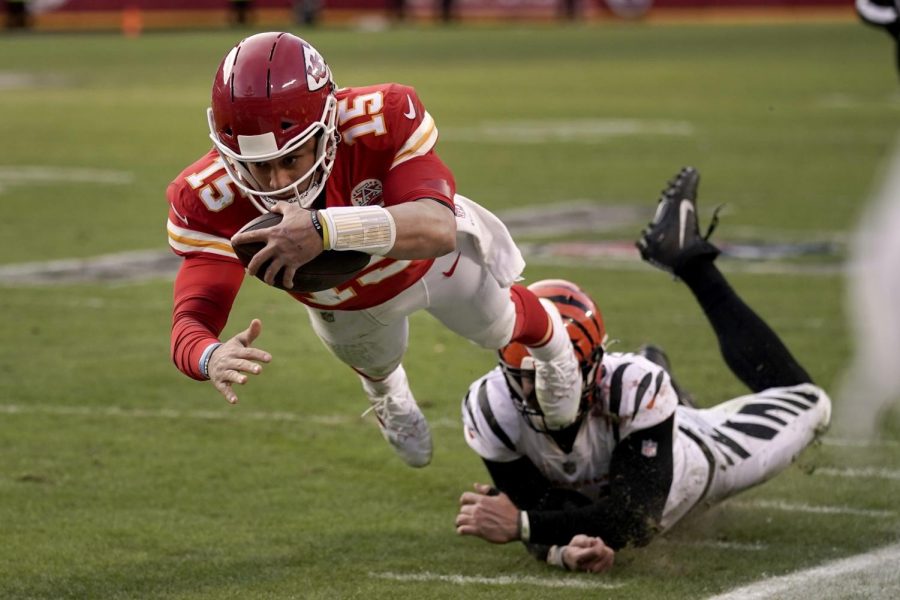Point-Counterpoint | NFL overtime rules are sufficient, teams need to play defense
Kansas City Chiefs quarterback Patrick Mahomes (15) dives after running the ball ahead of Cincinnati Bengals defensive end Trey Hendrickson, right, during the second half of the AFC championship NFL football game, Sunday, Jan. 30, 2022, in Kansas City, Missouri.
February 1, 2022
This column is part of a point-counterpoint series. To read the opposing side, click here.
The end of the AFC divisional round matchup between the Kansas City Chiefs and the Buffalo Bills raised questions about the NFL’s overtime rules. With the game tied at 36, Chiefs’ quarterback Patrick Mahomes II found tight end Travis Kelce for a game-winning touchdown on the first drive of overtime. Many believe that the rules are not fair to both teams and that a coin toss determines the outcome of the game.
But the NFL overtime rules are fair and should not be changed. To change the rules would be to admit that defense doesn’t matter in the NFL.
The current overtime rules have many different outcomes. If a game is tied at the end of regulation, there is a coin flip, based on the rules implemented in 2010. Whatever team wins the coin toss then has the choice to receive or defer the ball.
If the receiving team scores a touchdown, then the game ends. If the receiving team kicks a field goal, the defending team gets a chance to tie the game with a field goal or win with a touchdown. If the receiving team does not score any points on the first drive, the game becomes sudden death and the next score wins. Any defensive score ends the game.
In the regular season, overtime consists of a 10-minute period and if there is no winner the game ends in a tie. In the postseason, the period is upped to 15 minutes, and if neither team scores, the game will continue until one team does.
Bills quarterback Josh Allen and Mahomes were in a shootout, combining for over 700 passing yards and seven touchdown passes. Many believe Allen should have gotten a chance in overtime.
But the AFC championship was not a bout between Allen and Mahomes. It was the Bills against the Chiefs.
The reality of the game is that it should have never gone to overtime. The Bills and their No. 1 defense allowed 10 points in the last 1:54 of the game — including a 44-yard drive with 13 seconds left that ended with a game-tying field goal. The Bills defense had another chance in overtime to get a stop. Yet, they failed once again.
While Allen and wide receiver Gabriel Davis put on a performance worth remembering, we can’t reward the Bills defense for completely imploding at the end of the game. Does defense not matter?
The Cincinnati Bengals defeated — ironically — the Chiefs on Saturday in the AFC championship game. The game also went to overtime and the Chiefs once again won the overtime coin toss. The thought in almost everyone’s head was “oh no, not again.” The counterpoint automatically gave the game to the Chiefs. The Bengals defense said otherwise.
Bengals safety Vonn Bell intercepted Mahomes to set up a game-winning field goal. The Bengals didn’t concede defeat after losing the coin toss. They accepted the challenge and picked up a clutch stop when it mattered most. That instance alone proves that you can win despite luck not being in your favor.
The idea that winning the overtime coin flip automatically wins you the game is far from the truth. Since its implementation, the coin toss winner has won 52.8% of the games. Almost half the time, the coin toss winner actually loses the game.
If the NFL were to change the rules, what would be the alternative? An extra 15-minute quarter with no sudden death? Football is a physical sport that takes a toll on players’ bodies. Adding additional periods that have no guarantee of ending the game puts players at unnecessary risks.
There isn’t an alternative logical enough to implement over the NFL’s current rules. Football is a three-phase sport — offense, defense and special teams. The current overtime rules utilize all three facets.
The empathy toward the Bills offense is understood. Everyone wanted to see Allen and Davis get another shot to score. But the Bills defense failed them, and the team deserved to lose because of that.








